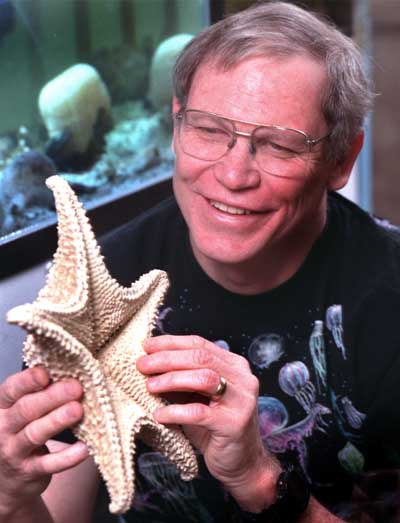Don't accuse Alec Motten of spoon-feeding his introductory biology students just because he serves up sushi, fried calamari and blue cheese during lectures that cover vertebrates, invertebrates or fungi.
He's not above sprawling on the ground to demonstrate the stature of early land vertebrates.
And he tips off students to the day's study by his attire - donning a jellyfish-print shirt for a lecture on coelenterates, or stripping off a shirt covered in toads to reveal a dinosaur T-shirt when the topic changes from amphibians to reptiles.
Move over Ms. Frizzle. The winner of Trinity College's David and Janet Vaughn Brooks Distinguished Undergraduate Teaching Award drives Duke's magic school bus. For Motten, associate professor of the practice of biology, taking new students on a journey through the science of living organisms is rife with joyous discovery.
"I try to see things through the students' eyes and remember the sense of wonder and discovery I repeatedly have in biology courses," Motten said.
Motten, 52, sees his mission as honing students' powers of observation and curiosity in the world around them, just as his parents did with him. Growing up in and around Philadelphia, he picked up his mother's interest in plants while tagging along on the tours she led through the Academy of Natural Sciences where she was a docent - "the one who convinces the inner-city teacher it's OK to handle snakes," he said. Frequently he brought home specimens that the museum decommissioned from its collections.
Family camping trips on weekends and ventures into Latin America - his father was a professor of Latin American history at Temple University - exposed him to even more unusual life forms.
"I was always comfortable in the woods," he said. "My family had a reverence for the natural world. A deeper understanding can improve your appreciation of its beauty."
After a four-year stint in the Navy to satisfy his Reserve Officers Training Corps responsibilities, he studied for a doctorate in botany at the University of North Carolina at Chapel Hill, then crossed over to Duke where he obtained his doctorate in zoology in 1982. He stayed on at Duke as a zoology lecturer.
With one foot in botany and the other in zoology at a time when they were separate departments, Motten felt qualified to call himself a biologist. "A nice way of putting it is that I am a generalist," he said. "Another way is that I'm a dilettante."
Motten was Duke's only professor of biology before the departments merged and was one of the first professor of the practice appointments when Duke developed that arrangement for non-tenure-track faculty. Because Motten is a broadly trained biologist, he feels comfortable introducing science to students, many of whom have no intention of majoring in biology.
|
"It's a niche not filled by others in the department," he said.
Biology has no deep concepts, Motten said, but draws in information from many unrelated disciplines. He gives students organizing principles and context to make connections for themselves, regardless of their career interests. To interest a pre-med student in parasites, for instance, Motten broaches a discussion of third-world public health, lifestyle and ecology. Or he points out the possible pharmaceutical implications of rain forest plants. And describes a non-majors class as "featuring hands-on activities." "If I called it a lab, they'd stay away in droves," he said.
When Duke called for writing coaches in the 1980s, Motten's wife, a physical chemist who will teach at Duke next year, got him interested in tutoring students. That he was able to engage students who didn't want to be in the writing lab and didn't think they needed to be there attests to his contagious enthusiasm.
Motten and his wife have two grown sons, one of whom studies classical guitar at the School of the Arts. "How two scientists came up with a musician is something I don't understand as a biologist or a parent," he said.
The enthusiasm Motten brings to teaching the attributes of his father, who won prestigious teaching awards at Temple and who died in January.
"He was the one I could talk to when a lecture went well or when something didn't go well," Motten said. "My biggest regret is that I couldn't share this [winning the award] with my father."
Motten's father taught him that every lecture should tell a story, and every exam should teach.
"Any professor can write an exam to expose what students don't know," Motten said. "I try to write an exam that students feel they've learned something from taking it. I give them a chance to show what they know and make a synthesis they've never done before. That I got from my father very strongly."
On the last day of class last semester, Motten's students presented him with a caricature of himself and his TA, drawn by a student and signed by everyone in class, causing a rare moment when Motten was rendered speechless.
"I was so moved and honored by their effort and interest," he said. "The award reflects that teamwork that came together."
|
